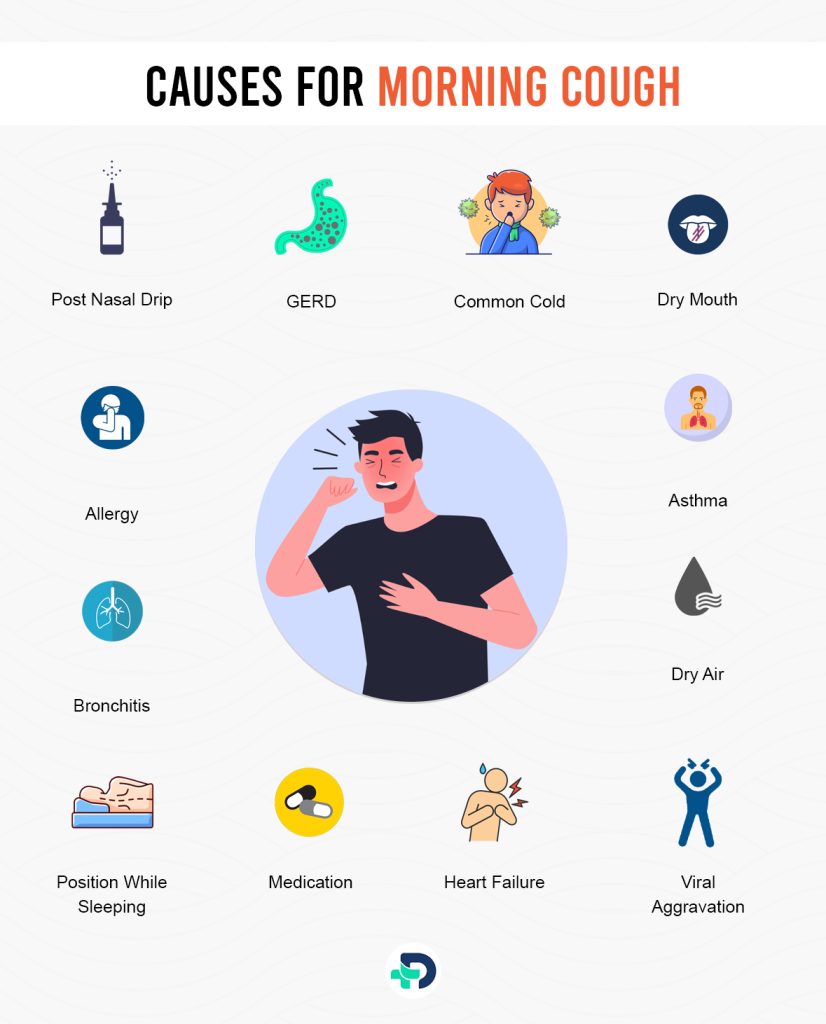Coughing In The Morning: Causes & Management

- Cough
- 29 Sep 2023
Overview
Cough
Your body’s natural response to removing foreign particles from your lungs is to cough. Dust, mucus, and even microbes are all possibilities. As long as it doesn’t last more than a few days, a cough won’t do any harm to you or anybody else. The presence of discolored mucus may indicate an underlying health issue.

Your body continues to work and do its own tasks when you sleep at night. The accumulation of mucus in the lungs over the night might lead to a cough first thing in the morning. The process is the body’s natural method of elimination.
You shouldn’t ignore a morning cough, and you should keep a close eye on your phlegm since its color may help us diagnose a wide range of health issues.
Morning Cough
What is Morning Cough?
- People often encounter “morning phlegm” or “morning sputum,” which is characterized by an urgent need to clear the throat or cough after awakening. Depending on the individual, this phenomena may occur more or less often and with greater or lesser intensity.
- Excess mucus in the respiratory tract is typically the cause of the coughing. The cells lining the respiratory airways produce a sticky and thick substance called mucus. To keep harmful particles, germs, and irritants out of the lungs, it acts as a filter for the airways. The typical function of mucus production in the body is to keep the respiratory system clear and healthy.
- However, mucus may build up in the back of the throat and the respiratory passages as we sleep.
Causes

Causes for Morning Cough
There are several potential reasons for a morning cough, and pinpointing the precise one is essential for providing successful therapy. Some typical triggers for a morning cough include:
Post Nasal Drip: 1 Causes | Researched based study from National Institutes of Health
- One common cause of waking up coughing and irritated nasal passages is Postnasal Drip, in which mucus from the nose drips down the back of the throat as you sleep.
GERD:
- Heartburn, chest discomfort, and coughing are all symptoms of gastroesophageal reflux disease (GERD), a disorder in which stomach acid refluxes into the esophagus and irritates the lining.
- Acid is more likely to flow back up into the esophagus after laying down, which might make this reflux worse in the morning. It may also be exacerbated by eating a heavy meal late at night or by taking drugs that weaken the lower esophageal sphincter.
- They may also suffer hoarseness, a burning sensation in the throat, and a sour taste in the mouth if their morning cough is due to GERD.
- Coughing from gastroesophageal reflux disease (GERD) may be alleviated by raising the head of the bed, not eating after 8 p.m., and avoiding hot and fatty meals.
- The common cold is a frequent cause of a cough in the morning. The common cold is a contagious upper respiratory tract illness caused by a virus.
- A sore throat, runny nose, cough, sneezing, and overall feeling of malaise are common symptoms. A persistent cough is often the first symptom to manifest and the last to clear up.
- The common cold virus replicates in the mucus of the upper respiratory tract and is transferred via intimate contact with an infected individual, as well as by coughing, sneezing, touching contaminated surfaces, and so on.
- Treatment for the common cold is focused on symptom relief and stopping the spread of the virus since it cannot be cured. Treatment options include rest, lots of water, and over-the-counter drugs including decongestants and pain killers.
- Xerostomia (dry mouth) is a condition in which saliva production is insufficient to maintain a moist mouth and throat. As dryness in the mouth may irritate the throat and produce coughing, it is not uncommon for people to have a morning cough when they first wake up.
- In addition to foul smell and a raw or cracked tongue, other symptoms of dry mouth include increased thirst. Dry mouth may have a variety of causes, from dehydration to pharmaceutical side effects.
- In any event, the symptoms may be managed by drinking enough fluids and maintaining a state of hydration.
- Chewing sugar-free gum or sucking on sugar-free hard candy might help alleviate dry mouth. Avoiding alcoholic beverages and cigarette products may also be beneficial. If the problem continues, talk to your doctor about treatment and management options for dry mouth.
Allergy:
- A morning cough may be the consequence of an allergic response to anything, such as pollen, dust mites, pet dander, or mould, which causes inflammation and mucus production in the respiratory system.
Asthma:
- Inflammation and a constriction of the airways are hallmarks of the chronic illness known as asthma. A chronic, nightly cough that persists into the morning may be an indicator of poorly managed asthma.
- Mucus production increases and morning cough are common symptoms of COPD, a group of lung diseases that includes chronic bronchitis and emphysema.
Viruses of the Respiratory System:
- Excess mucus production and irritation from a cold, flu, or other respiratory illness might cause coughing first thing in the morning.
Bronchitis:
- Acute or chronic bronchitis causes a rise in mucus production, which might manifest as a cough first thing in the morning.
- Inflammation of the airways and a cough first thing in the morning may be caused by exposure to smoking, pollution, and other airborne irritants.
Dry Air:
- Morning cough may be the result of dehydration of the respiratory passages and increased mucus production from a too dry sleeping environment.
Position While Sleeping:
- A morning cough may be the result of an improper sleeping posture that prevents mucus from draining. When you lie flat, for instance, mucus might collect in your throat.
Medication:
- Some drugs, especially ACE inhibitors used to treat hypertension, have been linked to a persistent cough, which may be more pronounced first thing in the morning.
- Fluid buildup in the lungs from heart failure may cause coughing, which is generally worse in the morning.
Viral Aggravation:
- Viral inflammation in the respiratory system may linger even when there is no active infection, leading to increased mucus production and a cough in the morning.
This is by no means an all-inclusive list, and there may be other, less frequent reasons as well. You should be checked out by a doctor to find out what’s going on if you or a loved one has a chronic or severe case of morning cough.
Symptoms
Symptoms of Morning Cough
Different symptoms may accompany a morning cough, and the precise symptoms may change depending on the underlying reason of the cough. The following are some typical signs of a morning cough:
- Cough: Coughing when you first wake up in the morning is the main symptom. The cough may be dry or productive, which means it would cough up mucus or phlegm.
- Production of Mucus or Phlegm: 2 Symptoms | Researched based study from National Institutes of Health Mucus or phlegm is often expelled from the respiratory passageways by a morning cough. The mucus’ color and consistency might provide information about the underlying illness.
- Throat Clearing: People who have a morning cough may regularly do so in an effort to lessen the feeling of mucus or irritability.
- Hoarseness: A raspy voice or hoarseness may be caused by irritation from coughing and mucus.
- Chest pain: Some persons with morning coughs may feel tightness or pain in their chest as a result of their strenuous coughing.
- Shortness of Breath: You may suffer shortness of breath, particularly after coughing, if the underlying cause is a respiratory illness like asthma or COPD.
- Wheezing: When you breathe, particularly during or after coughing, you may make a high-pitched whistling sound known as wheezing. It often relates to ailments like asthma.
- Stuffy or Runny Nose: You can also suffer a runny or stuffy nose if postnasal drip is the cause of your morning cough.
- Acid Reflux or Heartburn: You could also have symptoms like heartburn, a foul taste in your mouth, or regurgitation of stomach contents if GERD is the root of your morning cough.
- Thirst: You may have extreme thirst when you wake up if dry air or dehydration are factors in the cough.
- Tiredness: Frequent coughing may cause sleep disruption and exhaustion, which might affect one’s ability to function throughout the day.
- Body Aches & Fever: You may feel symptoms like fever, body pains, and exhaustion if the morning cough is brought on by an underlying respiratory illness.
It’s important to keep in mind that your particular symptoms will depend on the underlying reason for your morning cough.
Mechanism
Mechanism of Morning Cough
The physiological changes that take place in the nasal and respiratory passageways while you sleep may be used to explain the mechanism of morning cough, particularly in the setting of disorders like postnasal drip.
Mechanism behind morning cough
Production of Mucus:
- The cells lining the respiratory airways create mucus both during the day and at night. Mucus is essential for capturing and eliminating irritants, germs, and foreign objects from the airways.
Sleeping Position:
- When you lay down to sleep, mucus movement dynamics may alter. Mucus may build up at the back of the throat while lying flat, especially if too much mucus is being produced.
Throat Irritation:
- The throat lining may get irritated if there is too much mucus dripping down the back of the throat. This inflammation sets off the body’s natural defence system, which produces a cough to eliminate the irritant.
Coughing Reflex:
- Coughing is a reflexive action used by the body to clear the airways of impurities, irritants, or too much mucus. The cough reflex is triggered when the sore throat detects mucus in order to relieve the discomfort.
Clearing the Throat:
- You could also clear your throat in an effort to lessen the feeling of mucus or discomfort in your throat, in addition to coughing.
Effect of Gravity:
- The dynamics of mucus migration alter once again after waking up and standing upright. Gravity’s pulling power aids in moving mucus from the throat and into the upper airways, which may increase the effectiveness of coughing or throat clearing.
It’s wise to speak with a medical expert if you have a chronic morning cough or other respiratory issues. They are able to precisely identify the underlying reason and suggest the best courses of action for treating your symptoms.
Does post nasal drip cause morning cough?
Excess mucus from the nasal passages falls down the back of the throat in a condition known as postnasal drip. This may result in throat discomfort and create a number of symptoms, including coughing. Postnasal drip is explained in greater depth below:
While postnasal drip is often the culprit behind morning cough, other conditions including GERD, asthma, or environmental irritants may also play a role. Depending on the underlying illness, the mechanisms may change.
Causes:
- Allergies: Excessive mucus production may be brought on by allergic responses to things like pollen, dust mites, pet dander, or mould.
- Sinus Infections: The production and discharge of mucus may be enhanced as a result of sinus infections.
- Cold or Flu: Viral illnesses may result in mucus production and nasal congestion.
- Irritation: Smoke, pollution, dry air, and strong odors may irritate the nasal passages and cause an overabundance of mucus.
- Specific Foods: Some people may get postnasal drip as a result of eating spicy meals, dairy products, or items that induce acid reflux.
Symptoms:
- Coughing: A persistent cough, which is often worse at night or in the morning, is one of the most typical signs of postnasal drip.
- Throat Clearing: Repeated clearing of the throat to attempt to lessen the feeling of mucus in the back of the throat.
- Painful Throat: A scratchy or painful throat may be caused by irritation from the mucus.
- Hoarseness: The frequent clearing of the throat might irritate the voice chords.
- Nausea or Uncomfortable Stomach: Extra mucus might make swallowing more frequent, which can make you feel queasy or uncomfortable.
- Bad Breath: Mucus may hold onto germs, leaving the mouth with an unpleasant taste or odor.
When a morning cough is productive, what does that mean?
- Wet coughs or productive coughs are terms used to describe coughs that generate mucus. A dry cough or unproductive cough is one that doesn’t generate any mucus.
- There are several possible reasons for a morning cough, which is a rather frequent health problem. Your body uses coughing to remove irritants from your respiratory system. Phlegm and other irritants may accumulate overnight in your throat and lungs as you sleep.
- Phlegm begins to break up when you get up in the morning and may cause a coughing fit. A morning cough often doesn’t indicate a major medical issue. However, it may be necessary to contact a doctor if it persists after a few weeks or if it is making breathing difficult.
Diagnosis
How to Diagnose Morning Cough?
A combination of a medical history, physical examination, and perhaps diagnostic testing are used to determine the reason for morning cough. The normal steps in the diagnosing procedure are as follows:
Medical Examination:
- Your doctor will begin by inquiring in-depth questions about your symptoms, such as the kind of cough, when it happens (particularly in the morning), how long it has persisted, and any other symptoms it may be accompanied with. Your medical history, allergies, recent illnesses, and other relevant aspects of your lifestyle will also be inquired about.
Physical Examination:
- You will get a comprehensive physical examination to determine your general health, look for any indications of respiratory distress, and examine the state of your throat, nose, and chest.
Triggers:
- Your doctor will ask you about any possible causes of the cough, such as exposure to allergens, irritants, or changes to your sleeping environment.
Underlying Conditions :
- Your doctor will evaluate a number of possible underlying diseases that could be the source of the morning cough based on the details you offer. Postnasal drip, allergies, asthma, GERD, and other respiratory diseases may be among them.
Diagnostic Tests:
Your doctor could suggest certain diagnostic tests to further assess the issue depending on the likely cause:
- A Chest X-ray: It may be used to detect any abnormalities in the lungs or airways.
- Allergy Testing: If allergies are thought to be present, blood or skin testing may be used to pinpoint particular allergens.
- Tests of Pulmonary Function: These examinations gauge lung capacity and may aid in the identification of diseases like asthma.
- Nasal Endoscopy: This procedure involves inserting an endoscope, a thin, flexible tube with a camera, into the nasal passages to thoroughly inspect the nasal and throat regions.
- pH Monitoring: If GERD is thought to be present, pH monitoring may assess the quantity of stomach acid that is swallowed.
- Sputum Culture: A sample of mucus (sputum) may be examined for the presence of bacteria or other microorganisms if infection is a concern.
Trial Procedures:
- In some circumstances, your doctor may advise trying a therapy to see whether the symptoms get better. For instance, if postnasal drip is thought to be the cause of the cough, nasal sprays or antihistamines may be recommended.
Remember that successful therapy depends on a precise diagnosis. It’s crucial to get medical help if you have a chronic morning cough or any other unsettling respiratory symptoms.
What causes my cough to be worse in the morning?
- Even if you could cough continuously throughout the day, you can find that it becomes worse as soon as you wake up.
- Many of your regular mechanics slow down as you sleep. This also applies to the urge to cough repeatedly. While it is conceivable for a cough to wake you from sleep, irritants often gather around your coughing centres in the throat and cause a coughing fit when you awaken in the morning.
- Additionally, the cough becomes worse as soon as you wake up because of dry air in your room and decreased mucus production throughout the night.
- Your morning cough may have an underlying reason, but it becomes worse because of a number of variables.
Does having a morning cough indicate COPD?
- Breathing difficulties and a wet cough (which produces a modest quantity of mucus or phlegm) are the main signs of COPD. Wheezing, pressure in the chest, vomiting often, and exhaustion are further symptoms.
- Many patients visit their doctor or an urgent care facility in search of relief from the persistent cough brought on by COPD. This cough may start off as morning coughing, but it often develops into a cough that lasts all day. Ask your doctor about being tested for COPD if you have a chronic cough, which is defined as having a cough that lasts for at least three months for two years in a row.
- It may be necessary to see the doctor to make sure you aren’t experiencing a flare-up or exacerbation if you have previously been diagnosed with COPD and find yourself coughing more often than usual or producing sputum that looks different from how it usually does.
Treatment
Treatment for Morning Cough
Since a morning cough can be caused by things like postnasal drip, allergies, asthma, GERD, or other breathing problems, the way to treat it will depend on the cause.
Here are some general ways to treat a cough in the morning:
Postnasal Drip:
- Using saline nasal rinses or sprays to help clear the nasal airways of extra mucus.
- You can buy antihistamines over-the-counter to stop making mucus and treat allergy symptoms.
- Staying away from allergens or other things that cause post nasal drip.
- Elevate the head of your bed so that mucus doesn’t build up in the back of your throat.
Allergies:
- Figure out what makes your symptoms worse and stay away from it.
- Use Medicines for allergies, like antihistamines, decongestants, or nasal medicines.
- In serious cases, pollen treatment (allergy shots) might be a good idea.
Asthma:
- Inhalers and bronchodilators are used to control asthma symptoms and reduce inflammation in the airways.
GERD (Gastroesophageal Reflux Disease):
- Changes in lifestyle, such as not eating big meals before bed, raising the head of the bed, and staying away from foods that cause symptoms.
- Drugs that stop the stomach from making acid or help the esophagus work better.
Respiratory Infections:
- You can treat the symptoms with rest, water, and over-the-counter medicines 3 Treatment | Researched based study from National Institutes of Health .
- Use Antibiotics if it is a viral illness.
Chronic Respiratory Conditions (COPD, Bronchitis, etc.):
- Inhalers, bronchodilators, and other medicines to treat symptoms and improve lung function.
- Pulmonary therapy programmes to build up strength and stamina in the lungs.
Don’t be afraid to see a doctor if your symptoms are serious, last a long time, or are followed by other symptoms that worry you. This will help you get a good diagnosis and treatment.
What sets apart Morning Cough from a Smokers Cough?
Those who smoke often have a cough. The body is coughing up substances that have entered the lungs and airways as a result of smoking. Smoker’s cough is a chronic cough that lasts for longer than three weeks. Even while the cough can start off dry, it might ultimately produce phlegm.
Additional Signs:
- Incorporate chest ache and a sore throat.
- Quitting smoking is the best way to cure a smoker’s cough.
- When compared to other varieties of cough, a smoker’s cough may be identified by signs including phlegm production, crackling noises in the chest, and wheezing.
- However, it may be difficult to distinguish between a smoker’s cough and those connected to illnesses of the lungs like cancer or COPD.
- It is advisable to see your doctor to rule out any significant health issues with your morning cough, but it is also preferable to stop smoking.
When is the Mucus or Phlegm a Sign of Concern?
- Your body’s production of mucus and phlegm may provide information about your general health.
- When you cough in the morning or at any other time, the color and quantity of mucus and phlegm produced might suggest an infection or other medical issue.
- You should see a doctor if they encounter additional symptoms including fever, chills, a cough, or sinus discomfort in addition to persistent white, yellow, or green mucus or other symptoms.
- However, it’s typically okay to put off scheduling an appointment for a few days while trying to manage the symptoms at home.
- Anyone who has new or increasing amounts of red, brown, black, or foamy sputum needs to schedule an appointment with their doctor very once. These signs and symptoms can indicate a more severe medical problem that needs immediate attention.
Complications
Complications of Morning Cough
Morning cough has the potential to cause a number of difficulties if left untreated or if it’s a sign of another ailment. The degree of consequences varies depending on the cough’s underlying etiology and personal health conditions.
The following are some possible complications 3 Complications | Researched based study from National Institutes of Health of an untreated or improperly controlled morning cough:
Sleep Disturbances:
- Consistent morning coughing might interfere with your sleep cycle, causing sleep disruptions and afternoon weariness.
Irritation of the Throat & Airways:
- Prolonged coughing may cause inflammation, irritation, and hoarseness of the throat.
Worsening of Underlying Conditions:
- Cough that is caused by an underlying respiratory ailment, such as asthma or COPD, may aggravate these problems and cause more frequent or severe symptoms if left untreated.
- Untreated coughing may exacerbate acid reflux in those with gastroesophageal reflux disease (GERD) and lead to esophageal discomfort.
Chronic Cough:
- If left untreated, a morning cough that is just transient might develop into a chronic condition that lasts for days or even months.
Lung Infections:
- If the morning cough is brought on by a bacterial, viral, or fungal infection, untreated illness may progress and result in more severe respiratory problems.
Breathing Difficulties:
- People with asthma or other respiratory problems are more likely to have breathing difficulties as a result of coughing and the underlying conditions that cause it.
Reduced Quality of Life:
- A persistent morning cough may have a big influence on your everyday activities, making it harder to concentrate, work, exercise, and do other regular things.
Coughing Fits:
- Chest pain, bodily discomfort, and in some instances even fainting are complications from coughing fits that are severe and persistent.
- Hernias and urine incontinence will be due to coughing episodes.
Mental Impact:
- Due to the ongoing pain and disturbance that a chronic morning cough produces, it may lead to mental anguish, worry, and tension.
- Coughing often might compromise your immune system and increase your risk of contracting secondary illnesses.
Prevention
Prevention of Morning Cough
You may start by making certain lifestyle adjustments for some situations:
- Diet: Choose smaller portions, and eat your final meal at least two hours before bed. This may reduce the likelihood of acid reflux during sleep. With time, this little adjustment can lessen your morning cough. Avoid consuming heavy meals just before night, and learn which foods make your acid reflux symptoms worse.
- Cleanliness: Declutter your space and do a thorough cleaning. Your nighttime cough may be caused by the buildup of dust and dust mites in the room and on your bed. Additionally, it can make your underlying asthma worse.
- Humidifier: Think about installing a HEPA filter humidifier in your space. This lessens the possibility of drying up your respiratory passages and adds some moisture to the air.
- Ill habits: If you haven’t already, this would be a wonderful moment to give up smoking. Early stop smoking may help some lung function return in several illnesses, including COPD and bronchitis.
- Hygiene: It is better to avoid anybody who is coughing or has a cold if they are nearby. Wearing a mask and practicing good hand hygiene may help stop the spread of respiratory illnesses in the face of the impending pandemic.
- Allergies: Reduce your exposure to irritants in the air, such as smoking, powerful odors, and other airborne contaminants.
- Elevating the head of the bed: This may help reduce post nasal drip and GERD symptoms by preventing mucus from building up in the throat and acid from refluxing into the esophagus.
- Manage stress: Practice stress-reduction methods like yoga, meditation, or deep breathing exercises since stress may make certain forms of cough worse.
- Find a comfortable sleeping posture: It. promotes healthy mucus drainage and reduces the buildup of mucus in your throat.
- Maintain a healthy weight: Conditions like GERD or sleep apnea, which may cause a morning cough, can be exacerbated by being overweight.
Remedy
Home Remedies for Morning Cough
Certain juices may have relaxing characteristics that assist relieve throat irritation and support overall respiratory health, so they may be useful in reducing morning cough symptoms.
The following juices are often recommended for improving respiratory health:
Honey & Lemon:
- First, try drinking warm water with honey and lemon 4Prevention | Researched based study from National Institutes of Health to calm your sore throat. All you need is a spoonful of honey and a squeeze of lemon.
Ginger Tea:
- The anti-inflammatory qualities of ginger in tea form make it useful for soothing a sore throat. Fresh ginger slices may be steeped in boiling water to produce ginger tea.
Pineapple Juice:
- Pineapple juice may reduce inflammation because it includes bromelain, an enzyme found in pineapples. Pineapple juice has been used by some as a remedy for sore throats.
Turmeric Milk:
- Milk added with turmeric, has anti-inflammatory and antioxidant benefits thanks to the compound curcumin found in the spice. Warm milk laced with turmeric may be calming.
Honey with Apple Cider Vinegar:
- Warm water with a teaspoon each of apple cider vinegar and honey is recommended by some for soothing a sore throat. However, owing to the acidity of vinegar, this cure should be taken with care.
Carrot Juice:
- Carrots’ vitamin and antioxidant content helps maintain a healthy immune system.
Water:
- Keeping your respiratory passages moist by drinking water throughout the day is crucial.
Keep in mind that although these cures may provide some comfort, they are in no way meant to replace professional medical advice and care. Seek medical advice if your morning cough lasts more than a few days or is very severe or accompanied by other signs of concern.
Conclusion
Coughing in the Morning – If Persistant Consult a Doctor
A puzzling and bothersome presence in the daily routine is often a morning cough. Changes in weather, diet, and environmental factors may all affect it. Keeping careful note of your cough, its change throughout the day, and any other symptoms you detect is an essential approach to comprehend and settle on a diagnosis for a morning cough.
A morning cough is now considered a possible early indicator of exposure to the COVID-19 virus. To a greater extent if accompanied by fever, headache, and olfactory changes. It’s recommended that you see a doctor as soon as possible if this happens to you.
With the right treatment and some easy lifestyle adjustments, morning coughs may go away for good. Explaining all the other symptoms you’ve been experiencing in addition to your morning cough could assist your doctor diagnose what’s causing your cough.
Any feedback on this article?
 This Articles content was accurate
This Articles content was accurate Very Informative Article
Very Informative Article I have a question or a comment
I have a question or a comment
 This article contains inaccurate content
This article contains inaccurate content This article was not helpful
This article was not helpful I have a question or a comment
I have a question or a comment
We appreciate your helpful feedback!
Checkout our social pages
References
-
National Institutes of Health
Causes
-
National Institutes of Health
Symptoms
-
National Institutes of Health
Treatment | Complications
-
National Institutes of Health
Prevention



































